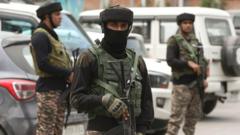India has expressed strong opposition to the IMF's recent decision to approve a $1 billion bailout package for Pakistan as regional tensions continue. Despite India's protests, the IMF justified its action by highlighting Islamabad's improvements in economic recovery and commitment to resilience against climate challenges. In this context, India raised concerns about potential misuse of the funds for state-sponsored terrorism, arguing that the IMF's decision could tarnish its reputation and contradict global values. However, experts point out India's limited influence within the IMF due to procedural constraints and unequal voting power compared to richer countries. Additionally, recent IMF precedents, such as its unprecedented aid to Ukraine, complicate the situation further. Critics suggest that India could more effectively address its concerns about funding for terrorism within the Financial Action Task Force, rather than relying on the IMF.
**IMF's Bailout to Pakistan: India's Influence and Limitations Explored**

**IMF's Bailout to Pakistan: India's Influence and Limitations Explored**
The recent approval of a bailout package for Pakistan by the IMF raises questions about India's ability to affect decisions within the global financial body amid strained relations.
In the recent approval of a $1 billion financial aid package for Pakistan, the International Monetary Fund (IMF) has ignited tensions with India as military hostilities between the two nations escalate. The IMF noted Pakistan’s substantial progress in program execution and economic recovery, justifying the bailout by reaffirming its commitment to support Pakistan's resilience to climate vulnerabilities and disasters. Despite expressing discontent, India’s interventions yielded no immediate effect on the decision, which also included an additional $1.4 billion in future funding access.
India raised serious allegations regarding the potential for the bailout funds to support terrorism directed at India, arguing that Pakistan's track of reform implementation raises questions about the effectiveness of such aid. While Pakistani experts concede that India has valid points regarding the bailout's historical context—citing Pakistan's tendency to repeatedly seek IMF assistance without meaningful reforms—India's influence on the IMF board remains constrained.
As one of many board members, India's sway is limited to a coalition that encompasses Sri Lanka, Bangladesh, and Bhutan—while Pakistan is part of a separate group dominated by Iran and other Central Asian nations. The IMF operates on a voting system weighted by economic size, which leaves India with only a small voting stake. The complexities of the situation are further deepened by recent IMF assistance to war-torn Ukraine, suggesting that the financial organization may not view the principle of conflict-derived funding as a barrier.
Critically, experts suggest that India would benefit more from addressing its concerns about Pakistan within the frameworks of the Financial Action Task Force (FATF), rather than attempting to leverage influence at the IMF. The FATF evaluates compliance on matters of terrorism financing and has previously affected Pakistan's international financial credibility. However, Pakistan's removal from the FATF's grey list complicates India's recourse.
In conclusion, while India may seek to assert influence in international financial matters, the reality of its position within the IMF reveals limitations. As calls for reforms regarding voting rights and funding processes circulate, experts warn that any shifts could disproportionately empower rival nations, particularly China. Addressing bilateral disputes through multilateral discussions remains a delicate balancing act for India as geopolitical dynamics continue to evolve.
Pakistan's financial assistance IMF India Kashmir
India raised serious allegations regarding the potential for the bailout funds to support terrorism directed at India, arguing that Pakistan's track of reform implementation raises questions about the effectiveness of such aid. While Pakistani experts concede that India has valid points regarding the bailout's historical context—citing Pakistan's tendency to repeatedly seek IMF assistance without meaningful reforms—India's influence on the IMF board remains constrained.
As one of many board members, India's sway is limited to a coalition that encompasses Sri Lanka, Bangladesh, and Bhutan—while Pakistan is part of a separate group dominated by Iran and other Central Asian nations. The IMF operates on a voting system weighted by economic size, which leaves India with only a small voting stake. The complexities of the situation are further deepened by recent IMF assistance to war-torn Ukraine, suggesting that the financial organization may not view the principle of conflict-derived funding as a barrier.
Critically, experts suggest that India would benefit more from addressing its concerns about Pakistan within the frameworks of the Financial Action Task Force (FATF), rather than attempting to leverage influence at the IMF. The FATF evaluates compliance on matters of terrorism financing and has previously affected Pakistan's international financial credibility. However, Pakistan's removal from the FATF's grey list complicates India's recourse.
In conclusion, while India may seek to assert influence in international financial matters, the reality of its position within the IMF reveals limitations. As calls for reforms regarding voting rights and funding processes circulate, experts warn that any shifts could disproportionately empower rival nations, particularly China. Addressing bilateral disputes through multilateral discussions remains a delicate balancing act for India as geopolitical dynamics continue to evolve.
Pakistan's financial assistance IMF India Kashmir






















